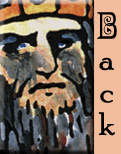|
"The Enochian Tarot - your New Age map of Life!" These are the beginning words of the text on the
box of another tarot from Llewellyn, USA. Like the box of "The Witches Tarot" this one is too
large, so the publisher had to fill it up with foam to make it last during transportation to the
customer. I wonder, what hidden motives led to the construction of these boxes? Can any of our
readers suggest a plausible explanation? In the booklet supplied with the deck, the publishers
tell us that the deck is primarily meant to be used for forecasting the future; on the other hand
they also state, that the deck is "...a system of self-discovery, which allows you to see your
relationship to God and the Universe". Quite an impressive program, isn't it?
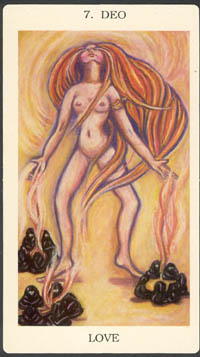
Apart from that, the first impression of the deck itself is agreeable. It does not look very much
like a tarot deck, and not many of the traditional tarot figures are immediately recognizable.
The structure of The Enochian Tarot differs likewise considerably from the traditional tarot
structure. Modern Enochian Magic took its origin from discoveries of Dr. John Dee and his medium
Edward Kelly who, in the 16th century through scrying, discovered an ancient language, which they
called "Angelic" or "Enochian". The basic construction of this deck is based upon Dee's and Kelly's
"Enochian tablets", called "Watchtowers". The major arcana consist of 30 cards, each representing
an "Aethyr", a locality or region, an area of knowledge, that in a way can be compared to the values
of the spheres and paths of the kabbalistic Tree of Life. The minor arcana cards each represent a
deity or a group of deities, which inhibit the regions.
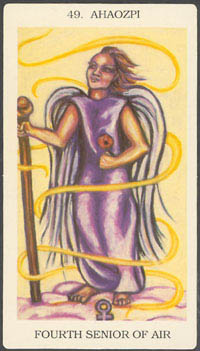
Knowledge and use of Enochian Magic has not been so widespread like, for example, the Kabbalah,
even if it was a part of the teachings of The Golden Dawn. One reason could be the apparent
complexity of the system. Enochian Magic has however always been a major theme in Llewellyn
publishing policy, and a number of books on the subject are available in their program. The deck
at hand could be a handy tool that might spread the interest for Enochian Magic to a larger number
of people.
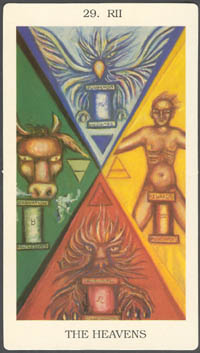 Even if the booklet says, that this pack can be used in the same way as other tarot packs, that
is actually not the idea. Most tarot users will likely find this deck difficult to use in their
usual way. To get the full benefit from it, you need to take time to get an idea of what Enochian
Magic is all about. For this purpose, the accompanying booklet is in my opinion not very helpful.
Llewellyn has, however, also published an introductory booklet to Enochian Magic. It is written
by the same authors and is called "The Truth About Enochian Magic". On thirty pages, the authors
explain and give a survey of the system, that gives a good idea of what Enochian Magic is all about.
If you want to know more, Gerald and Betty Schueler also wrote a 340 page detailed book,
"The Enochian Tarot". The structure of the Enochian Tarot Deck is explained and the meaning of,
and correspondences to each card, are given in detail. This is surely not a book to be read from
beginning to end, but more like an encyclopaedia to use during work with the deck.
Even if the booklet says, that this pack can be used in the same way as other tarot packs, that
is actually not the idea. Most tarot users will likely find this deck difficult to use in their
usual way. To get the full benefit from it, you need to take time to get an idea of what Enochian
Magic is all about. For this purpose, the accompanying booklet is in my opinion not very helpful.
Llewellyn has, however, also published an introductory booklet to Enochian Magic. It is written
by the same authors and is called "The Truth About Enochian Magic". On thirty pages, the authors
explain and give a survey of the system, that gives a good idea of what Enochian Magic is all about.
If you want to know more, Gerald and Betty Schueler also wrote a 340 page detailed book,
"The Enochian Tarot". The structure of the Enochian Tarot Deck is explained and the meaning of,
and correspondences to each card, are given in detail. This is surely not a book to be read from
beginning to end, but more like an encyclopaedia to use during work with the deck.
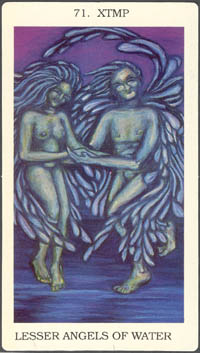
Back to the cards. The booklet says "Art created by Gerald and Betty Schueler. Painted by Sallie
Anne Glassman". Rather confusing, but probably the publishers mean, that the card's concept was
by G.& B. Schueler, and that the art was created by artist Sallie Anne Glassmann. You do not say,
that the art of the Waite-Smith Tarot Riders pack was created by Arthur E. Waite, and paintings
made by Pamela C.S., do you? I suppose the process was, that the Schuelers discussed the symbolic
content of each card with the artist, and she then executed it in her own style. Actually,
Sallie Anne Glassmann has an art style, which to me makes a difference from The Witches Tarot,
that could have been commissioned to any commercial advertising bureau. Sallie Anne Glassmann's
86 cards constitute a strange world, inhabited by supernatural or celestial beings, that can be
looked upon with pleasure even if you do not know anything at all of the Enochian concept.
It might be of interest to the readers of this review to know, that Chris Zalewski, living in
New Zealand, is working on a book on The Enochian Chess. Her intention is to make the Enochian
chess accessible both as an occult tool, a divinatory game and also as an entertaining and
different game for players. Literature on Enochian Chess is rather sparse and mostly quite obscure.
There is a great need for such a book, and we are looking forward to see the results of Mrs.
Zalewsky's work, which she estimates will be finished in 1990.
|


 Even if the booklet says, that this pack can be used in the same way as other tarot packs, that
is actually not the idea. Most tarot users will likely find this deck difficult to use in their
usual way. To get the full benefit from it, you need to take time to get an idea of what Enochian
Magic is all about. For this purpose, the accompanying booklet is in my opinion not very helpful.
Llewellyn has, however, also published an introductory booklet to Enochian Magic. It is written
by the same authors and is called "The Truth About Enochian Magic". On thirty pages, the authors
explain and give a survey of the system, that gives a good idea of what Enochian Magic is all about.
If you want to know more, Gerald and Betty Schueler also wrote a 340 page detailed book,
"The Enochian Tarot". The structure of the Enochian Tarot Deck is explained and the meaning of,
and correspondences to each card, are given in detail. This is surely not a book to be read from
beginning to end, but more like an encyclopaedia to use during work with the deck.
Even if the booklet says, that this pack can be used in the same way as other tarot packs, that
is actually not the idea. Most tarot users will likely find this deck difficult to use in their
usual way. To get the full benefit from it, you need to take time to get an idea of what Enochian
Magic is all about. For this purpose, the accompanying booklet is in my opinion not very helpful.
Llewellyn has, however, also published an introductory booklet to Enochian Magic. It is written
by the same authors and is called "The Truth About Enochian Magic". On thirty pages, the authors
explain and give a survey of the system, that gives a good idea of what Enochian Magic is all about.
If you want to know more, Gerald and Betty Schueler also wrote a 340 page detailed book,
"The Enochian Tarot". The structure of the Enochian Tarot Deck is explained and the meaning of,
and correspondences to each card, are given in detail. This is surely not a book to be read from
beginning to end, but more like an encyclopaedia to use during work with the deck.

